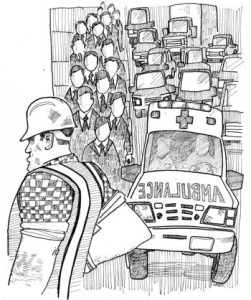By Peter Norman
A respectable man noticed a woman seated on a bench, gazing around her and writing in a ledger. The man was about to continue on his way when the woman looked directly at him, frowned, and after a few moments continued writing.
The man approached her. “What are you doing?” he asked.
“I am taking the minutes,” the woman replied.
The man surveyed his surroundings. Cars and trucks heaved this way and that; ambulances shrieked by on urgent business; men in suits bustled. There was no evidence of a meeting near this bench. Everything was in motion, everyone was hurrying elsewhere, and no one was sitting down except this woman.
Finally the man said, “For what meeting exactly are you taking the minutes?”
“I am taking the minutes of the day.”
“The whole day?”
“Yes.”
“Impossible!” cried the man triumphantly, feeling he had caught the woman out. “One cannot record everything that is spoken and accomplished in a single hour, let alone an entire day. Look at all these businessmen! Look at the constable directing traffic! The hole that is being dug for the foundations of a great tower! I defy you to capture all this in your little ledger.”
“What you say is accurate, sir. It is impossible to note everything, so I must sift. I choose what to record and what to discard. If I may say so, sir, it is a most arduous task.”
“May I see what you have written?” said the man.
“I am sorry, sir, but regulations forbid me to disclose the minutes until they are formally registered.”
The man drew himself up to full height, which was quite unnecessary since the woman was seated. “Very well, then. I am forced to come to the point. A busy man troubles himself with another’s work only when it concerns him directly. If you were not a naive young woman, I would not need to point this out.”
“Indeed, sir, I am well versed in the ways of busy men. Experience taking minutes has served me well. Moments ago, you saw me glance at you before writing something down, and you wish to know what part you play in the record.”
“So you are observant, even in your foolishness. Then, pray, will you disclose at least the information that concerns me?” The woman sighed, rose to her feet, and handed the man her ledger. “I will bend the rules for you this one time. You may read only the last page.”
The man sat, fished out his monocle, and read:
Noon. Temperature moderate; slight gusts ruffle the clouds.
A furtive creature makes a racket in the bushes. Recorder cannot discern species. Stray cat, perhaps, or man.
Over the road, coated in clay and grime, a construction man pauses in his labour, occupied by thoughts of home. He has been scolded recently by his wife. His foreman does not know or care, and orders him back to work.
A man in the late stages of life spies the minutes being taken, approaches the bench. He will demand to see the record. Reading it will devastate him.
At his feet and below his notice, a squirrel rushes across the path, something clutched in its mouth.
As he read, the man grew very cold. When he reached the final sentences, he started to shiver.
He handed the ledger to the woman. “Your minutes are inaccurate,” he said, staggering to his feet.
“Not inaccurate,” she said in a sad voice, “merely selective.”
“Your selections, then, are very poor,” the man said weakly.
“My selection can be neither poor nor astute,” said the woman. “It pleases you, or it does not. If you were not an ignorant man, I would not need to point this out.”
The man turned his back and walked slowly away. He could not remember exactly where he had been going when this interruption occurred. He knew only that it was somewhere important, a place of commerce. Perhaps if he continued to place one foot before the other, his destination would present itself.
Around the man, squirrels and muskrats and moles skittered from here to there on most urgent business.
Peter Norman’s stories have been in subTerrain, This Magazine, Forget Magazine, and Victory Meat: New Fiction from Atlantic Canada (Anchor, 2003). He probably lives in Calgary.
